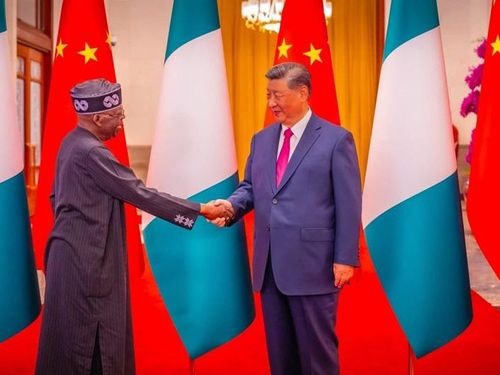China-Nigeria economic ties deepen after President Bola Tinubu and Chinese President Xi Jinping held a talk on Tuesday in Beijing on nuclear energy, media exchanges, and infrastructure ahead of the three-day Forum on China-Africa Summit scheduled for September 4-6, 2024.
Xi and Tinubu agreed on a “comprehensive strategic partnership” which marks a significant step towards a stronger collaboration between both countries. China intends to get more involved in Nigeria's economic development, particularly through its $1 trillion global infrastructure initiative.
Tinubu is currently in Beijing, China for the Summit of the Forum on China-Africa Cooperation (FOCAC) 2024 and seized the opportunity to visit the state house.
The high-level meeting Jinping and Tinubu held in Beijing aimed towards forming stronger bonds between both countries regarding issues of interests.
During the meeting, China’s President Xi Jinping stated that since the establishment of the China-Nigeria diplomatic tie for the past half a century, both countries have always shown mutual understanding. He also commended the strategic mutual trust, and bilateral relations that exist between both parties and advised for it to continue for as long as possible.
“China and Nigeria, as major developing countries, strengthening strategic coordination, will inject fresh impetus to China-Africa relations in the new era and spearhead common progress among Global South countries,” Presiden Xi Jinping said.
According to China’s State Council, Tinubu expressed his hope that Nigeria would become China’s largest trade and investment partner in Africa.
President Bola Tinubu also welcomed Chinese companies who showed interest in investing to increase investments in the country, expand cooperation in various fields including agriculture, manufacturing, and mineral energy, and help alleviate poverty.
In a statement released by the office of the Nigerian President, Tinubu said the countries’ partnership would result in “robust development, stability, and security”.
Tinubu stated that “China and Nigeria relations have indeed lasted for over half a century and will continue to be strengthened to advance our trade and economic development.”
“You have upgraded the relationship to what is more than just strategic in addressing developmental problems.”
Tinubu stated: “We have recognized the need to reform our economy, and we are doing so diligently across tax and tariff reviews, to various other segments of our nation’s economy,” and “trading and investment partners will have easy access to bring in their investments and seamlessly take their resources out.”
Furthermore, President Tinubu stressed “Nigeria has a very great potential as the country with the largest population in Africa and the biggest in the area of young population that can drive economic growth”.
“This is a very important visit for Nigeria and the rest of Africa as the Chairman of ECOWAS.
According to Beijing’s Ministry of Commerce, the Chinese state-run Export-Import Bank of China in Nigeria is financing 85 percent of the cost of the $5.8bn proposed Mambilla hydroelectric plant, which is set to be the country’s largest power plant upon its scheduled completion in 2030.
Africa has been singled out by China as a key region for the push of its signature global infrastructure, the Belt and Road Initiative, with Chinese companies signing contracts worth more than $700 billion on the continent.
Wrapping Up
The commitment by Presidents Xi and Tinubu to deepen China-Nigeria economic ties signals stronger cooperation in trade, infrastructure, and investment. This partnership is expected to drive mutual growth, enhance Nigeria’s development, and solidify China’s influence in Africa, benefiting both nations' long-term economic aspirations.




